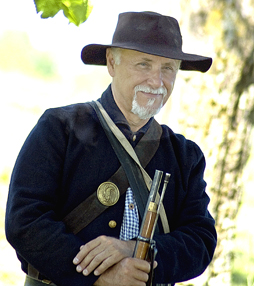|
Part one of two-parts
Civil War’s perceived glory soon clashed
with grim reality for common soldier
By DOUG LIPPMAN
(EDITOR’S NOTE: Civil War historian, educator and writer Doug Lippman describes the life of the Common Soldier in this two-part series. Lippmann also “walks-the-walk,” portraying that role at living history events and re-enactments of the period.)
From the time they were children, the young men of 1861 had been regaled with stories of their elders' exploits during America's three great wars.
The Revolutionary War had purchased our independence. The War of 1812 had finally and conclusively driven the British from our lands. The Mexican War had fulfilled much of America's desire for Manifest Destiny. When numerous skirmishes with the American Indians were thrown into the mix, many young men began dreaming of the day when they could prove their manhood in battle. Few realized that the foe would this time be their fellow Americans.
Like soldiers of all eras, the Civil War soldiers were primarily in their late teens and early twenties. This was the same age group that had fought most of the great wars of recorded history. Such young men tended to be naive, seeking adventure and glory. While most of these young men were unmarried, they came from all walks of life.
Johnny Reb was most likely a yeoman farmer and had many advantages with weapons and horses. Most Yanks were farmers also, but many were clerks, mechanics, teachers or preachers. Northern recruits were at no disadvantage when it came to fighting or riding. Still, these young men looked forward to a short war, which would not seriously change their lifestyle or values. Many of both sides anticipated that the war could be won with one decisive battle, and so hastened to enlist, fearing the war would end before they could establish themselves as their predecessors had.
Few soldiers adjusted easily to taking orders from others. In some cases the problems were social. Young men from working class backgrounds, especially, tended to resent the authority of officers, and particularly that of upper class officers who enjoyed such delicacies as cheese and wine. Common soldiers also resented walking while their officers rode horses.
Many of the behaviors which the recruits were punished for were commonplace behaviors accepted back home, such as speaking out freely. These men were highly individualistic, and were reluctant, at best, to take orders from a stranger. Some even challenged their officers to a fight. Quite frequently, the popularity of an officer was determined by the punishment employed to enforce military discipline. Some, such as Confederate Gen. Patrick Cleburne, never physically punished men for infractions, but instead required extra duty details to be served. Other officers on both sides demanded physical or demeaning punishments. In severe cases some officers enforced the letter of the military law by ordering executions. So while one officer's punishments promoted good will and admiration, another promoted anger and resentment.
By the time the war ended, the face of the soldier had changed in many ways. For example, more than 400 women are known to have disguised themselves and fought in the ranks of the Union armies. Doubtless, this was true to a similar degree in the Confederate armies as well. Following the Emancipation Proclamation, 182,000 Black soldiers fought for the Union, and thousands of them sustained casualties.
More than three million Americans donned a uniform, and the nature of our nation was forever redefined. These young people were anxious to "see the elephant," and saw little need for all the drill and marching which all trainees must endure. A new Esprit de Corps gradually replaced the rugged individualism, which has previously characterized the typical American. When combat finally came, many were appalled at the "Carnival of Death" they witnessed. It wasn't long before the fresh, young faces of the new enlistees were replaced by reflective and care-worn stares.
The most basic unit in combat was the regiment. These were formed in rural and urban areas all across the country, with entire companies and even regiments coming form a single locale. Therefore, these soldiers fought next to their brothers, cousins, and friends. If a single regiment was decimated in battle, entire communities could lose significant sections of their male populations. Life was already difficult with the youngest and strongest laborers away from the farm or shop, but it became much worse when wives realized that their husbands would not be returning.
However, there were also advantages to forming entire regiments from a single area. Many men, who would otherwise have possibly run from battle, stood courageously and fought, not wanting any of their relatives or acquaintances to think them cowards. This did not mean, however, that desertion was not a serious problem. The closer an army was to home, the greater the incidents of desertion. At the end of the war, many Southern soldiers deserted because their homes were threatened by invading forces. Desertion reached its peak in the Union ranks immediately following the issuance of the Emancipation Proclamation due to the controversial nature of the measure.
During those long periods when there was no combat, the soldiers drilled, drilled, and drilled some more. They were forced to march long distances and had to be prepared to move quickly to the scene of a battle. Since the average soldier was only about 5' 8" and weighed approximately 145 pounds, the forty pounds of gear and eleven pound rifle made marching a fatiguing and potentially hazardous matter. Many soldiers died of heat exhaustion, while others froze to death on picket duty. Few initially realized the importance of this training and discipline, but that all changed as the casualty lists grew.
Part 2 of Doug Lippman's story will be published in the 3rd quarter issue of "The Kentucky Civil War Bugle" in July.
|









